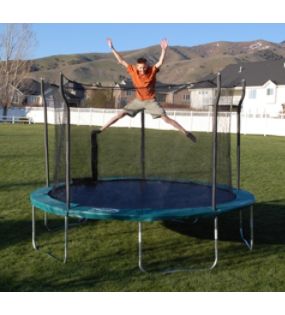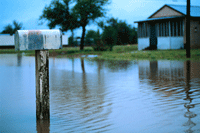 Trampolines help your kids burn off excess energy, and they’re a great weight loss tool for you. However, the American Academy of Pediatrics recommends that all consumers avoid using trampolines because unsafe use of this backyard toy can cause head and neck injuries, fractures and sprain. As a homeowner, don’t set up a backyard trampoline until you find out more about your liability.
Trampolines help your kids burn off excess energy, and they’re a great weight loss tool for you. However, the American Academy of Pediatrics recommends that all consumers avoid using trampolines because unsafe use of this backyard toy can cause head and neck injuries, fractures and sprain. As a homeowner, don’t set up a backyard trampoline until you find out more about your liability.
Check Your Homeowners Insurance Policy
Trampolines are fun, but the expenses could quickly outweigh any enjoyment. Some insurance companies will not insure your home if you have a trampoline. They may either cancel your policy or exclude coverage for any trampoline-related injuries. Either way, you’ll be personally liable for any injuries that occur.
Set It Up Properly
If your homeowners insurance policy does cover your trampoline, be sure you set it up properly as you increase its safe operation.
*Follow the manufacturer’s instructions when setting up and using the trampoline.
*If possible, place the trampoline at ground level rather than above ground.
*Remove tree branches and other hazards located nearby.
*Provide adequate padding on the springs as you prevent pinching.
*Secure a safety net around the trampoline.
*Inspect the trampoline and all its parts regularly for wear and tear.
Provide Constant Supervision
Guests who are injured while using your trampoline can sue you. Be sure you provide constant supervision to ensure everyone practices safe jumping. That means only one person at a time should jump, and no one should do somersaults or flips, two major causes of spine injuries.
Fence-In Your Yard
You’re liable for injuries that occur by anyone who uses your trampoline, even if the jumper doesn’t have your permission or trespasses in your lawn. Protect yourself with a tall fence. It should have a self-latching lock on the gate for greater security.
Your family and friends can enjoy fun in your backyard thanks to your trampoline. Be sure to understand your liability, though, before you install one.
Read more
 Whether you live near a body of water or not, flood insurance might be a good investment. It’s usually not included in your regular homeowners or renters insurance policy, though. Consider five factors as you decide if you need this type of insurance coverage.
Whether you live near a body of water or not, flood insurance might be a good investment. It’s usually not included in your regular homeowners or renters insurance policy, though. Consider five factors as you decide if you need this type of insurance coverage.
- Do you live in an area with a high flood risk? If so, you definitely want flood insurance coverage. That’s because your home, located near a river, stream, lake or flash-flood zone, faces a high threat of flooding. Protect your home and its contents when you buy a flood insurance policy.
- Do you live in a low flood risk zone? Consider that the local sewer system or nearby storm drain could overflow and cause extensive damage. Because a flood insurance policy typically costs less for customers who live in low-risk areas, purchasing a policy makes sense even if you don’t live near a major body of water or in a flood zone.
- Do you rent your home? Most landlord insurance policies cover the buildings only. They do not insure your home’s contents. Consider flood insurance that replaces any possessions that are damaged by flooding.
- Do you have a mortgage? Check with your lender about flood insurance requirements. If you live in a flood zone, you will probably need to carry this coverage and prove that you’ve purchased a policy before you can sign the loan documents.
- Do you own any possessions? In just a few inches of water, your appliances, furniture and other belongings can be damaged beyond repair. So, if you own any possessions, consider flood insurance that provides financial reimbursement and allows you to replace items that are damaged by excessive water.
Before discounting flood insurance, talk to your insurance agent. He or she will answer your questions and help you decide if coverage is a wise investment for you. In many cases, the coverage is invaluable.
Read more
To celebrate St. Patrick’s Day, did you purchase a home DNA kit? The results reveal facts about your ethnicity, ancestry, paternity, and health. However, consider several facts about the use and safety of home DNA tests before you purchase one.
How your DNA is Used by Others
You can learn valuable information from a home DNA test. Your data could be used by other people, too, though, in several ways.
- Familial DNA Searches – You could be contacted by family members who may wish to build a relationship or do you harm. Additionally, law enforcement personnel can search DNA sites for familial connections that help them find crime suspects or solve crimes.
- Health Recommendations – You can pursue professional medical treatment based on your DNA results, but prescription and over-the-counter drug companies can also access your information and spam you with recommendations for their medications, vitamins and supplements.
- Insurance Queries – Life and health insurance companies can access your DNA results, determine if you carry a gene that causes diseases or increases your desire to take risks, and decide if they want to insure you.
- Employment Discriminations – The Genetic Information Nondiscrimination Act passed in 2008 forbids employers from hiring or firing anyone based on genetic information. However, your DNA records are public knowledge and easily accessible by employers.
Are DNA Tests Safe?
Your DNA includes your complete genetic code, making it one of your most valuable possessions. For this reason, carefully consider who should have access to your DNA data and sample.
- Carefully read the company’s privacy policy, including the fine print, to discover:
- How the company stores, uses and shares your information.
- When and how you can access your data and sample.
- If your sample will be used for research.
- The security of the digitized copy of your data.
- What happens to your information if the company is sold or you cancel your account.
- Consider skipping the extra questions about your lifestyle, health habits and personal preferences. Anyone can search the site’s database and discover your identity along with your private information.
- Consider how the results could affect your family’s privacy. For instance, would you want long-lost relatives to contact you?
- Discern if you’re emotionally ready to learn that about illnesses or diseases you could develop. Home DNA companies typically do not include counseling like genetic clinics offer.
- Hackers want your personal information, so research the reputation and security protocols of the DNA site before you sign up.
Home DNA testing can reveal amazing details about your ancestors, health and future.
Read more
 Drone operation does include cyber risks you should understand before you operate your machine.
Drone operation does include cyber risks you should understand before you operate your machine.
Remote Takeover
Most drones operate via a Wi-Fi or Bluetooth connection through your smartphone or tablet. The connection may not be secure, though. A hacker can jam, intercept or terminate the connection or GPS, take over your drone and steal it or crash it into something.
Malware
The computer or mobile device you use to operate your drone could become infected with malware. It can affect the connection to your drone and cause the machine to crash and potentially cause physical or property damage.
Access Photos or Videos
A camera attached to your drone can transmit stunning photos and videos from the air. These images are usually transmitted over an unsecured FTP server which a cyber attacker could access and share. This privacy breach is your responsibility.
Ways to Protect Your Drone
Protect your drone from cyber crime when you take several steps.
Ask the seller about their cybersecurity measures.
Most drone sellers include the machine’s cybersecurity information on their website. If you can’t find it, contact the company for additional information.
Test your drone’s security.
Hire a cybersecurity professional to test your drone and ensure it’s safe from cyber threats.
Connect to your drone via radio control.
Use a secure radio control connection since Wi-Fi and Bluetooth connections rely on unencrypted data links that are vulnerable to hackers.
Subscribe to a VPN service.
A Virtual Private Network (VPN) encrypts your internet connection and protects it from hackers.
Install a seL4 operating system.
Equip your drone with new seL4 OS technology. This operating system isolates various functions on the drone, preventing a hacker from taking over your machine.
Install an anti-virus program.
Reduce viruses, malware and other threats when you install protective programs on your computer or mobile device. The most secure programs provide real-time antivirus and anti-theft protection.
Vary your flying habits.
When you fly your drone in the same flight paths and at the same time every day, you make yourself vulnerable to hackers. Instead, vary your flying habits and throw hackers off your trail. Consider flying in remote locations, too.
Purchase drone insurance. Call us.
A drone insurance policy provides you and your drone with important coverage. Look for a policy with:
- Broad, legal and premises liability coverage
- Personal injury and medical expenses
- Hull coverage
- Extra equipment coverage for any on-board cameras, tools and equipment
- Invasion of privacy
Your drone is vulnerable to several cyber risks. Know the risks and how to stop them so you can enjoy your drone and keep it secure.
Read more
As the fires rage in Northern (and Southern) California, a topic like this is worth writing about. Earthquakes are always a threat, but floods, wildfires, hurricanes, and such are more apt to strike in the warmer summer months.
Please be safe and healthy.
There are three very important steps you can take to limit the effect natural disasters have on your life and property and expedite your recovery process.
1. Planning. There are some basics that any natural disaster plan should include:
- Always have several escape routes mapped out. Each family member should know where to meet, who to call for help, and where to call to signal their safety to other family members. Your family safety plan should be posted in a central location and the escape route and emergency contact numbers should be reviewed every six months.
- If possible, store irreplaceable items and documents like birth, marriage, death, and divorce certificates; passports; deeds; social security cards; expensive jewelry; and heirlooms in a safety deposit box during high-risk seasons if you live in an area frequently hit by natural disasters. You may also put video or photo documentation, a listing of serial numbers, appraisals, and receipts for these items in your safety deposit box.
- Scan your photos to your computer. You can store your photos with an online storage service or make a CD to place in your safety deposit box.
- You should have an emergency overnight bag ready to go for every person and pet in your family and always keep a credit card, emergency cash supply, and personal identification with you during high-risk seasons.
As far as disaster-specific planning goes, here are some key points:
Flood planning. Many people live in possible flood areas and don’t realize it. For example, those living in areas that recently had a wildfire and those living downstream from a dam could have problems with flash flooding. Those living in or near a construction area could find their risk of flooding increased due to changes in water flow patterns. You can assess your risk of flooding by contacting your local building authority and your insurance agent. Since basements aren’t usually covered by typical flood insurance policies, those with a basement need a plan on moving their valuables to upper-levels. Do make sure that you have an escape plan, as discussed above, in place for your family.
Hurricane planning. Most people in areas prone to hurricanes are already on high alert during hurricane season, but do keep in mind that hurricanes and the stormy remnants are often unpredictable. The flood planning from above is applicable to hurricane planning. Additionally, you’ll want to have a supply of nails and plywood ready to go so that you can board-up your home before evacuation. Remember, if your local authorities issue an evacuation, then you need to heed it.
Wildfire planning. Wildfires can begin unnoticed and spread rapidly with little forewarning. An effective evacuation plan is vital in many cases. If you do have forewarning, then stay tuned to the emergency broadcasts and follow the evacuation directions from local authorities. Remember to take your emergency evacuation bag with you.
If you’re under a warning, but haven’t been advised to evacuate yet, then you might have time to turn off your gas lines and propane tanks, soak your roof and shrubs with water, move flammable furniture to the center of rooms, and move large valuables to the safest location possible.
Tornado planning. Unlike many other disastrous events, leaving your home during a tornado warning is seldom a wise move. Everyone in your family should know where they should go during a tornado warning. While a basement is ideal, not everyone has one. You can use a central room; preferably one that doesn’t have windows or overhead objects. Be sure your emergency kit and phone numbers are in your designated room.
Earthquake planning. Follow the directions from tornado planning. You might also want to place an emergency kit in your vehicle and at your place of employment. Check to make sure your child’s school is also well-prepared.
2. Prevention
Aside from living in an area not prone to natural disasters, there isn’t much you can do to avoid them. However, unlike most other natural disasters, wildfires can sometimes be prevented. You can personally prevent fires by being careful when using open flames, maintaining your chimney flue, and not throwing cigarettes outdoors. Of course, wildfires can happen regardless of your personal care with fire.
You can help to prevent flames from impacting your home by creating a defensible space. In fact, some insurers are now inspecting properties for defensible space before issuing or renewing policies. Your insurance agent, local agricultural organizations, and federal agencies like the American Red Cross and FEMA are valuable information sources on creating defensible spaces. The damage of flooding can also be limited by planning water diversions and landscaping as protective devices.
3. Insurance
Last, but certainly not least, you should make sure your existing insurance is providing adequate protection. For example, your regular Homeowners policy most likely won’t provide coverage if a boulder falls or rolls into your home since such would be considered an earth movement and need to be covered by Earthquake insurance. Another example would be your regular Homeowners policy not covering damage from a water or sewage system outside your home breaking, or damages from a flash flood, as these would fall under Flood insurance. If you obtain Flood insurance, keep in mind that the coverage won’t become effective for 30 days and your basement usually still won’t be covered.
Read more
 Don’t wait until the weather forecast calls for prolonged heavy rains before buying flood insurance. While this practical insurance can be purchased anytime, the policy does not take effect for 30 days. As the most common natural disaster in the country, flooding ruins millions of dollars of homes and property every year. Even so, flooding is not commonly covered in your typical homeowner’s insurance policy, making it necessary to purchase additional coverage for this costly, devastating disaster.
Don’t wait until the weather forecast calls for prolonged heavy rains before buying flood insurance. While this practical insurance can be purchased anytime, the policy does not take effect for 30 days. As the most common natural disaster in the country, flooding ruins millions of dollars of homes and property every year. Even so, flooding is not commonly covered in your typical homeowner’s insurance policy, making it necessary to purchase additional coverage for this costly, devastating disaster.
If you are in a high-risk flood zone, a federally regulated lender will require a would-be borrower to buy flood insurance in order to qualify for a mortgage loan. To satisfy the lender, flood insurance must be purchased in an amount that sufficiently covers the loan.
A homeowner should also buy flood insurance if he or she resides in a flood plain with no fail-safe controls, such as a dam. Flood policies even pay off if the President does not declare the area a federal disaster area, which can prove to be invaluable. Because the nation’s Chief Executive Officer rarely issues such a declaration, protecting yourself is extremely important. Besides, you have to repay the federal aid you receive for home repairs related to a natural disaster so providing your own protection is the only way to ensure financial recovery suffered from flooding.
Not all homes qualify for flood coverage. For instance, flood insurance for beachfront or ocean-side property may not be available for the obvious reasons.
The Federal Emergency Management Association (FEMA) reports that more than 20,000 communities have agreed to tighter zoning and building measures to control floods. Residents of these communities can buy flood coverage from the National Flood Insurance Program (NFIP), which FEMA oversees. As of 2009, NFIP had 5.7 million flood policies inforce nationwide.
Premiums for flood insurance vary widely, depending primarily on individual risk. In determining price, flood insurance underwriters consider several factors including the property’s elevation, proximity to bodies of water, and whether the dwelling has a basement. Flood insurance is available to homeowners, renters, condo owners/renters, and commercial owners/renters.
Call our office today! We’d be happy to assist you through the murky waters.
Read more
 Trampolines help your kids burn off excess energy, and they’re a great weight loss tool for you. However, the American Academy of Pediatrics recommends that all consumers avoid using trampolines because unsafe use of this backyard toy can cause head and neck injuries, fractures and sprain. As a homeowner, don’t set up a backyard trampoline until you find out more about your liability.
Trampolines help your kids burn off excess energy, and they’re a great weight loss tool for you. However, the American Academy of Pediatrics recommends that all consumers avoid using trampolines because unsafe use of this backyard toy can cause head and neck injuries, fractures and sprain. As a homeowner, don’t set up a backyard trampoline until you find out more about your liability.
 Whether you live near a body of water or not, flood insurance might be a good investment. It’s usually not included in your regular homeowners or renters insurance policy, though. Consider five factors as you decide if you need this type of insurance coverage.
Whether you live near a body of water or not, flood insurance might be a good investment. It’s usually not included in your regular homeowners or renters insurance policy, though. Consider five factors as you decide if you need this type of insurance coverage.
 Drone operation does include cyber risks you should understand before you operate your machine.
Drone operation does include cyber risks you should understand before you operate your machine. Don’t wait until the weather forecast calls for prolonged heavy rains before buying flood insurance. While this practical insurance can be purchased anytime, the policy does not take effect for 30 days. As the most common natural disaster in the country, flooding ruins millions of dollars of homes and property every year. Even so, flooding is not commonly covered in your typical homeowner’s insurance policy, making it necessary to purchase additional coverage for this costly, devastating disaster.
Don’t wait until the weather forecast calls for prolonged heavy rains before buying flood insurance. While this practical insurance can be purchased anytime, the policy does not take effect for 30 days. As the most common natural disaster in the country, flooding ruins millions of dollars of homes and property every year. Even so, flooding is not commonly covered in your typical homeowner’s insurance policy, making it necessary to purchase additional coverage for this costly, devastating disaster.